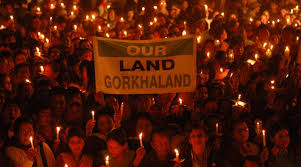Gorkhaland Movement:

The Union Government has appointed the former Deputy National Security Adviser (NSA) as interlocutor to engage with Darjeeling hill leaders on key demands, including Gorkhaland statehood and ST status for 11 Gorkha sub-tribes.
- The move aims to find a political resolution to long-standing identity and autonomy issues in the region.
- The West Bengal state government has criticized the decision as “unilateral” and inconsistent with the principles of cooperative federalism.
- Article 3 empowers Parliament to form new states or alter existing boundaries.
- The state legislature’s opinion is consultative, not binding, ensuring national flexibility.
- However, frequent boundary demands, such as Gorkhaland, strain Centre–State relations and test India’s federal harmony.
- The demand, therefore, is not just political but also a test of constitutional accommodation within the Indian Union.
- Demand for a Separate State: Demand for Gorkhaland has been Central to Gorkha identity politics since the 1980s, reflecting aspirations for recognition and self-governance.
- Proposed to include Darjeeling, Terai, and Dooars regions within West Bengal.
- Demand for Scheduled Tribe (ST) Status: 11 Gorkha sub-tribes—including Rai, Limbu, Gurung, Tamang, and others—seek ST recognition.
- Would enable access to reservation benefits, education, and government jobs.
- Despite multiple assurances, the recognition process remains pending, deepening community frustration.
- Concerns over the Agnipath Scheme: The short-term Agnipath military recruitment policy created uncertainty among Nepali-origin Gorkhas, traditionally serving in the armed forces.
- Nepal raised concerns that it may violate the 1947 Tripartite Agreement, which guaranteed pension and service rights.
- Reports indicate China’s possible interest in recruiting Gorkhas, raising strategic concerns.
- Maintaining robust India–Nepal–Darjeeling coordination is vital for border stability and preventing external influence.
Gorkhaland Movement:
- Origins (1980s): The demand for a separate state of Gorkhaland was first raised by Subhash Ghising, founder of the Gorkha National Liberation Front (GNLF).
- The agitation, driven by identity and administrative concerns, witnessed widespread violence and prolonged strikes during the 1980s.
- The movement resurfaced strongly in 2017, leading to 104 days of strikes and clashes across Darjeeling and adjoining hills under the Gorkha Janmukti Morcha (GJM).




